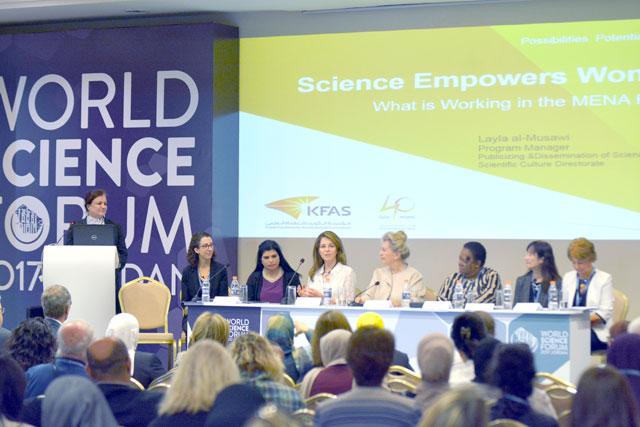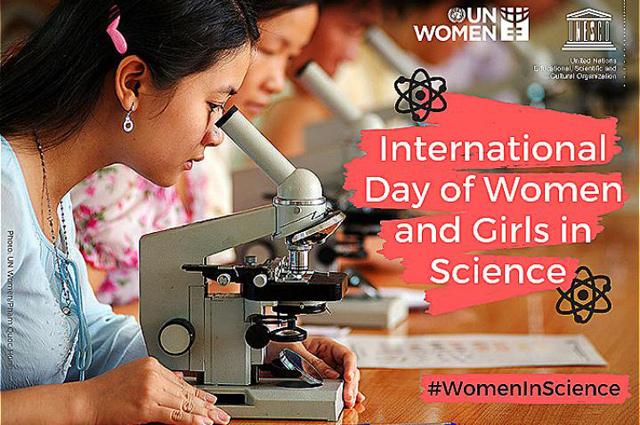You are here
Women call for increased number of female scientists in region
By Rana Husseini - Nov 11,2017 - Last updated at Nov 12,2017
DEAD SEA — Women scientists gathered at the Dead Sea for the World Science Forum 2017 on Friday agreed that women in the region need to work on closing the gap of knowledge by increasing the number of female Arab scientists in the region.
The remarks came during a half-day event titled “Gender Summit Platform for the Arab World” where Arab and international scientists, policymakers and academics discussed the establishment of a Gender Summit platform for the Arab World, which would join similar platforms already active in Europe, North America, Asia Pacific, Africa, and Latin America.
The Gender Summit was created in 2011, with the aim of enabling dialogue and consensus between scientists, gender scholars, policymakers and stakeholders in science endeavours.
The summit looks into the improvements needed in addressing unequal quality of research outcomes for women and men.
President of the Royal Scientific Society HRH Princess Sumaya, who inaugurated the gender summit, told the gathering that “we hope in this summit to reach the pinnacle of what we are trying to achieve through this world science forum”.
Associate Professor of Molecular Cell Biology at Hashemite University Rana Dajani also addressed the gathering saying that the gender summit was a first step “in the preparation of a full fledge summit in the future”.
“This summit is talking about how we can improve research to include women because it will serve in making better decisions and enforcing laws that address all segments of society humanities and not only a percentage of the community,” she said.
“We want to change the game by producing new rules to address and acknowledge the differences amongst us so we can create a better life for everyone,” Dajani noted.
South African Minister for Science and Technology Grace Naledi Pandor told the gathering that one of the things that needs to be tackled is public perception “because many women scientists in the Arab and African world tend to be invisible”.
“We have to look for ways to establish a global platform for women scientists by inserting gender into science to increase the number of women in the field,” Pandor said.
Others way to ensure stronger female presentation, Pandor added, is to ensure that women get more scholarships and grants, have access to scientific instruments that help women and men and become head of institutes.
“I really hope we will succeed in establishing a global community of female scientists because I believe that strong and knowledgeable women scientists can lead the change in the world,” she stated.
Former Jordanian minister of social development Nesreen Barakat pointed out that over 30 per cent of females in Jordan are enrolled in the scientific streams during their studies.
“But, when we look at the labour market, women choose different markets like education, which creates gender imbalances. We need to investigate why women do not assume this role,” Barakat said.
Former minister of transport Lina Shbeeb said that the solution “starts with ensuring gender equality from the grassroots, the family, universities and workplace”.
“We cannot deal with one aspect of the chain and forget the rest. It starts from when we are young and how we should bring up our daughters by encouraging them to become scientists, politicians or whatever they dream of,” Shbeeb added.
Mark Ferguson, director general of the Science Foundation Ireland and chief scientific adviser to the government of Ireland, recalled: “We wanted to have more females in the science arena so we started by introducing a gender strategy in the government, then offering 25 per cent of our grants to women. This has increased over the time and now we have more and more women joining.”
Ferguson added that “his foundation aims to have 50 per cent of women working there and I am certain we will get there. We just have to aim high and always be positive about it.”
Turning to youth and their role in gender science, Ahmad Jadallah, founder and CEO of the Phi Science Institute said that “there is a huge shift in the interest of science among females”.
“In Jordan, we need to focus on the education system which is deteriorating because it has no real science and research subjects. Most students focus only on getting a degree and a high grade because it is a social stigma,” Jadallah said.
“We need the youth to engage in real experiences and research to know what they need and want in their lives,” Jadallah concluded.
Related Articles
AMMAN — The Spanish embassy in Amman on Tuesday held an online symposium “Women in Science in the Middle East: A Jordanian perspective”, fea
DEAD SEA — About 117 people from around the world, 83 women and 34 men, packed the conference hall on Wednesday at the World Science Forum 2
AMMAN — This year’s celebration of the International Day of Women and Girls in Science, addresses the theme “Women Scientists at the Forefro













